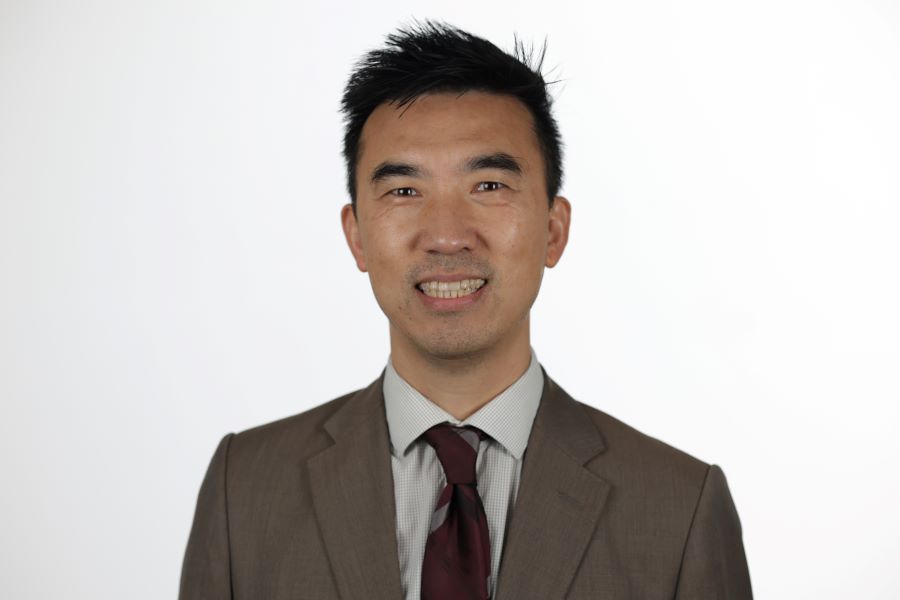Baylor Receives Fulbright-Hays Grant to Strengthen East Asian Languages, Asian Studies Program
Baylor’s $294,000 grant from the U.S. Department of Education supports research and training efforts overseas, which focus on non-Western foreign languages and area studies
Xin Wang, Ed.D., associate professor of China Studies and division director of African and Asian Languages at Baylor, is principal investigator of Baylor's first-ever Fulbright-Hays grant. (Robert Rogers/Baylor University)
Contact: Lori Fogleman, Baylor University Media & Public Relations, 254-709-5959
Follow us on Twitter: @BaylorUMedia
WACO, Texas (Oct. 11, 2023) – Baylor University has received its first-ever Fulbright-Hays grant that will assist the University in strengthening its East Asian language programs (Chinese, Japanese and Korean) and Asian Studies program.
The Fulbright-Hays Program – a Fulbright Program funded by a Congressional appropriation to the U.S. Department of Education – awards grants to individual U.S. teachers, pre-doctoral students and postdoctoral faculty, as well as to U.S. institutions and organizations. Funding supports research and training efforts overseas, which focus on non-Western foreign languages and area studies.
The $294,000 Fulbright-Hays grant will allow Baylor to:
- Hire a Full-time Lecturer in Korean during the grant cycle.
- Develop/Revive a Study Abroad Program in East Asia: Supporting a group of Baylor faculty for a field trip to East Asia and students with scholarships for summer study abroad opportunities in East Asia.
- Create Interdisciplinary Team-taught Courses in Asian Studies: For faculty development to develop innovative courses in Asian Studies.
- Develop Open Education Resources (OER) in Asian Languages and Asian Studies Courses: Helping a faculty member develop OER materials, organize workshops for faculty and reduce the cost of textbooks for students.
“This is very timely for us as the grant will help us strengthen our East Asian language programs as well as our Asian Studies program,” said principal investigator Xin Wang, Ed.D., associate professor of China Studies and division director of African and Asian Languages at Baylor. “The humanities don’t often get a lot of external grants, especially in substantial amounts. Therefore, it holds great importance to receive a Fulbright-Hays grant to support our students to acquire foreign language skills and gain a deeper understanding of different cultures and societies.”
Many of Baylor’s Fulbright-Hays grant-supported projects are well aligned with Baylor’s mission, as well as Provost’s and President’s initiatives, such as increasing interdisciplinary studies and programs, Wang said. The grant will support Baylor faculty members to develop new courses, which he describes as innovative team-taught, thematic-based courses related to Asia. For example, courses might focus on subjects such as urbanization in East Asia, East Asian cinema and literature, or East Asian humanistic traditions.
“We hope we can use this grant funding to bolster our course and curriculum development efforts and build an innovative approach to interdisciplinary education for our students,” Wang said.
Chinese, Japanese and Korean are among several languages taught in Baylor’s Department of Modern Languages and Cultures, which prepares students for the challenges and opportunities of global citizenship by fostering both linguistic proficiency and intercultural awareness. Foreign Language study at Baylor also includes Arabic, Swahili, French, Italian, German, Russian, Spanish and Portuguese.
In addition to foreign language studies, Baylor offers area studies programs in Asian Studies, Middle East Studies, Latin American Studies, and Slavic Studies. Asian Studies provides opportunities for study and research of diverse societies that inhabit the Asian continent, from the Ural Mountains to Southeast Asia. Interdisciplinary in approach, the program provides opportunities for overseas study and field experiences, laying a solid foundation for Baylor students to pursue careers in government service, business, and non-governmental organizations, as well as preparing them for advanced studies. Wang said that the grant will directly benefit students through scholarships for study abroad in East Asia.
“The Department of Education really liked the idea that we're building a regionally focused study abroad program in East Asia, including China, Japan and South Korea. In this program, students will study thematic issues concerning global health, technology, business, society and cultures in East Asia,” Wang said. “We aim to use the grant funding to help our students expand their horizon and enhance their knowledge and understanding of East Asia. Instead of following a traditional path, our students will engage in thematic, interdisciplinary courses that allow them to explore these subjects from multiple perspectives across disciplines.”
Bottom line, Wang said, context matters.
“We need to guide our students in comprehending cultures, peoples, and societies in East Asia, which play an important role not only in the world, but also, particularly, in the U.S. context of the U.S. economy and technology,” he said.
ABOUT BAYLOR UNIVERSITY
Baylor University is a private Christian University and a nationally ranked Research 1 institution. The University provides a vibrant campus community for more than 20,000 students by blending interdisciplinary research with an international reputation for educational excellence and a faculty commitment to teaching and scholarship. Chartered in 1845 by the Republic of Texas through the efforts of Baptist pioneers, Baylor is the oldest continually operating University in Texas. Located in Waco, Baylor welcomes students from all 50 states and more than 100 countries to study a broad range of degrees among its 12 nationally recognized academic divisions.
ABOUT THE COLLEGE OF ARTS & SCIENCES AT BAYLOR UNIVERSITY
The College of Arts & Sciences is Baylor University’s largest academic division, consisting of 25 academic departments in the sciences, humanities, fine arts and social sciences, as well as 11 academic centers and institutes. The more than 5,000 courses taught in the College span topics from art and theatre to religion, philosophy, sociology and the natural sciences. The College’s undergraduate Unified Core Curriculum, which routinely receives top grades in national assessments, emphasizes a liberal education characterized by critical thinking, communication, civic engagement and Christian commitment. Arts & Sciences faculty conduct research around the world, and research on the undergraduate and graduate level is prevalent throughout all disciplines. Visit the College of Arts & Sciences website.
